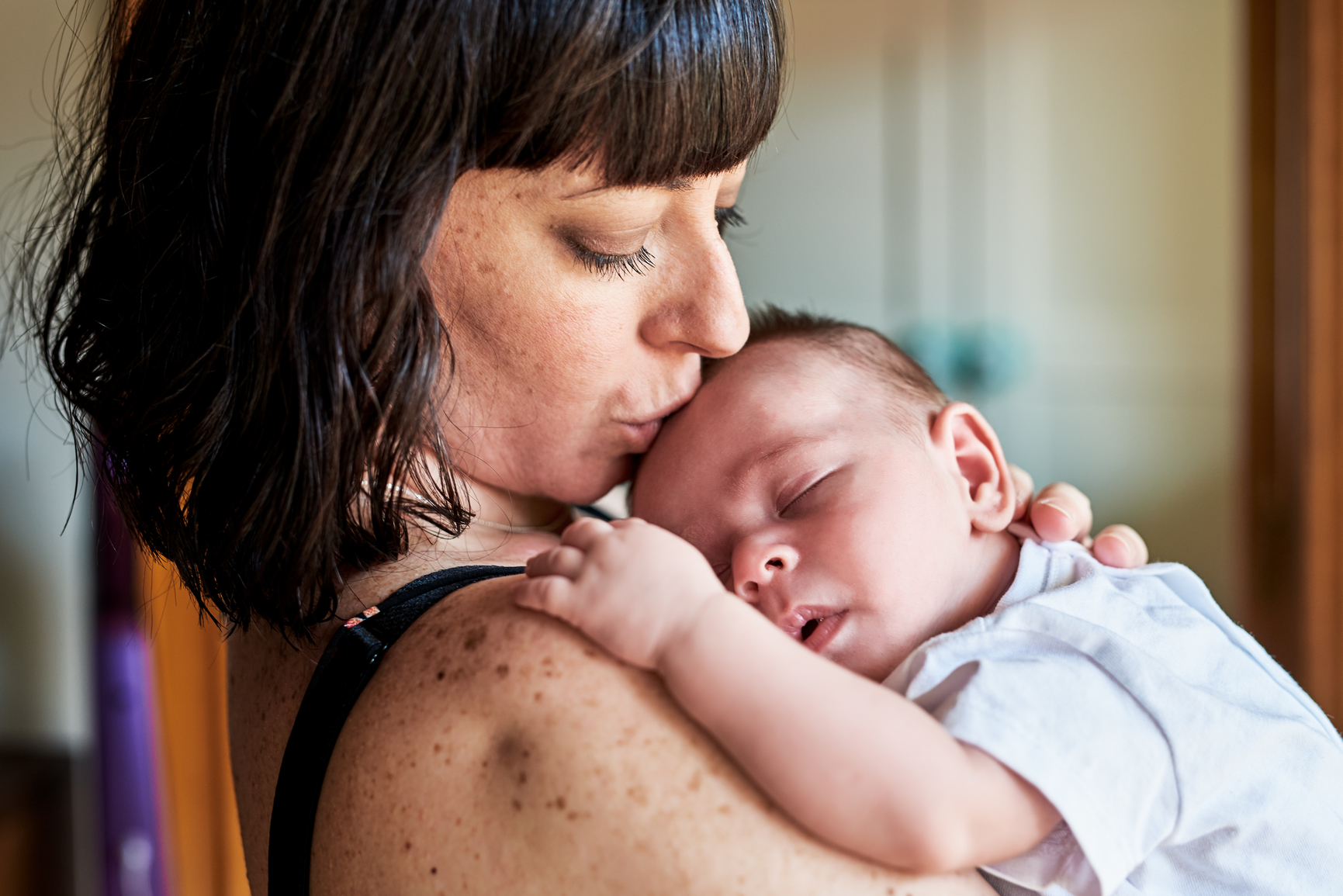-
Love is messy at the best of times, not to mention when you’re elbow deep in dirty nappies and don’t want to get out of the shower, let alone the house. So before you pop, let’s get one important thing out of the way; be patient with yourself when the time comes to bond with your baby. If you don’t feel an immediate connection to your noisy blob, you’re not a failure, and certainly not alone.
Read on as Dr. Nicole Highet, psychologist and founder and executive director of the Centre of Perinatal Excellence, sheds some light on the topic, assuring us that “It can take time to fall in love, even with your baby.”
Firstly, what even is mother-baby bonding?
‘Bonding’ is the intense connection many people describe feeling towards their baby. You’ve probably heard people gush about it as an instant ‘life-changing’ kind of love. The kind seen in the birthing suites of movies when the world glows pink and hearts melt into puddles on the hospital floor. But just like every other part of your pregnancy, your bonding experience will be unique. Here are five ways you can strengthen your baby bond
1. Cuddle time
If your birthing experience allows, get that brand new baby of yours onto your skin ASAP. This skin-to-skin contact can really help in the bonding process. If your baby is in special care, talk to your midwife or doctor to help you get as close as possible.
2. Communicate
It might feel a little strange at first, but do it anyway! There are plenty of ways you can communicate with your baby, from chatting or reading, to singing. Don’t underestimate the power of play. Throw in a smile and a funny face for good measure.
3. Acknowledging if you have experienced trauma and getting support
Often mothers who have experienced a traumatic birth will find it harder to bond and have positive feelings towards their baby. Talking about these experiences with a medical professionals or those you trust may help you move past any negative events, and look forward to time developing that positive bond.
4. Monitor visitors
People love to rush in and squeeze fresh cheeks before they’ve even been wiped clean. Don’t be afraid to ask friends and family to wait a few weeks so you can have some one-on-one time to get to know the new person in your life. If you have a partner, appoint them as your official bouncer.
5. Baby massage
It may sound new age and OTT, but don’t roll your eyes just yet. In many cultures, this is a practice that’s passed down from generation to generation. Massage can help you to focus on the marvels of your child and create a sense of calm between you both. Take note of their responses and cues to your touch. Not only can massage and touch help you bond, but it can help comfort your baby and alleviate symptoms of colic, helping you both relax.
6. Take care of yourself
You’ve probably heard it a million times since the strip turned pink, but this is actually solid advice. There are the obvious ways to take care of yourself (read: shower, sleep, don’t eat toast for every meal). Try to ditch the guilt and focus on the little things, like finding something to make you laugh, venting your negative feelings (it won’t all be sunshine and rainbows), or getting out of your pajamas.
READ MORE: 6 week survival guide
What if the ‘bond’ isn’t instant?
First of all, don’t worry. Just like your birthing plan, don’t set rigid expectations on your emotions after birth. With your hormones adjusting to life post-bump, you can’t expect to be in control of them anyway. There are lots of factors that can alter how quickly you bond with your baby. From exhaustion to an emergency c-section, or troubles with breastfeeding, your attachment to your baby may feel strained. Don’t force it, remember you have your whole life to fall in love with this little human.
Dr. Highet says, “Just like other relationships in your life, your feelings of love and attachment might be there instantly, but for many women it can take time - from a few days, to weeks, or even months to form. It’s important to give yourself and your relationship time.”
“Making time together for positive interactions will give your relationship the time and opportunity to develop. If however, you are having negative thoughts such as harming your baby, then it is important to seek help, as this may be a sign of other conditions that need to be treated.“
READ MORE: How to recognise postnatal depression
When do I call in backup?
Give it a couple of months. If your baby still feels like a stranger to you, chat to your doctor. Of course, if you don’t think you can take care of yourself or your baby, or you have negative thoughts about harming the baby - get help straight away. Reach out to your doctor or a Maternal, Child and Family Health Nurse. It might be the baby blues, or you may be struggling with postnatal depression. Either way, the faster you get help, the sooner you’ll feel better.
Before you meet the person living in your belly, take some time to get your support network in order. If that doesn’t mean family for you, look into what’s available in the community. Because, you know, it takes a village to raise a baby (and to keep you sane!).
What if I don’t bond with my baby?

-
How to introduce allergy foods
A guide to weaning and allergies
-
Immunisation 101: everything you need to know
Make sure your baby is fully immunised
-
The partner’s guide to breastfeeding
How you can help with breastfeeding
-
Bringing home a new baby during a pandemic
Bringing home a new baby is an exciting yet challenging time.
-
Your new baby admin checklist
A simple guide to ticking off all the paperwork for your new baby.
-
Getting in a routine with your new baby
Paediatrician Professor Harriet Hiscock shares some advice for adjusting to life with your little one, from feeding to sleeping to checking in with yourself.
Subscribe to receive the best from Live Better every week. Healthy recipes, exercise tips and activities, offers and promotions – everything to help you eat, move and feel better.
By clicking sign up I understand and agree to Medibank's privacy policy






